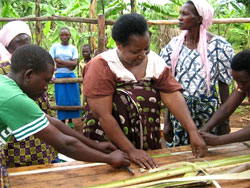It seems that there is nothing in this world involving money that cannot be franchised – this includes non-profit sector, and it is emerging and attracting social entrepreneurs and investors.

EBay drop-off franchises, science franchises, and some other innovative ideas are popping on daily basis, worldwide. But those share a common characteristic: All of them are for-profit organisation. Any chances for non-profits to be developed in franchising framework? I thought it wouldn’t be possible.
But all things are possible.
How about this fact: The worldwide emergence of non-profit franchises sound to you?
To some, non-profit franchising is an urban legend. To me, it sounds terrific and life-changing, although challenging to implement by both franchisors and franchisees.
What is social franchising? A case study
Social franchises are similar in characteristics with any other franchises, with one key difference: They serve non-profit causes.
I just spotted this brilliant social business idea: Let’s take one great social entrepreneurship idea turned into a non-profit franchise opportunity.
How does sanitary pad franchise sound to you? In my opinion, this is a great business idea, as it is laser-target a great niche in our society: women.
Let’s extrapolate the idea a bit further – how about this: The sanitary pad franchise is a social franchise aiming to tackle problems in locations where access to clean water and proper sanitary pad is limited (even almost non-existent)
Great social cause, great business concept, great potential. Period.
SHE – Sustainable Health Enterprises is thriving in tackling the sanitary pads access problems. Its first franchise was established in Rwanda in early 2009. The franchise unit is operated by women who manufacture and distribute low-cost sanitary pads.
The pads themselves are made of locally-sourced raw materials such as banana fiber, which benefits the local economy and keeps costs low.
Behold the power of franchising: SHE is implementing the franchising concept in order to make the business model easily replicable, thus attracting sociopreneurs and social investors to implement it wherever there is a need, fast. Moreover, microfinance loans and trainings are making the franchise concept even more appealing, thus allowing SHE to cover more regions.
Great opportunities always have some pitfalls ‘attached’ to them
Unfortunately, franchising is highly related to profit-making ventures – something that is a complete opposite of the nature of social entrepreneurship – non-profit.
The challenge would be for SHE to balance between the social causes and the profits to be made to support the business, as both are two different worlds. Compromising the non-profit characteristics not only undermine the franchise business, but also the causes themselves.
As suggested by the IFA, the key is to find the right balance.
One important key I want to highlight is for the non-profit franchise NOT to falter from the original purpose and compromise the value they have built before the offering of franchise opportunity. I also highlight choosing the right partner to be very crucial to make social franchising works – choosing partners who share the same value and ideal is a must.
Do you have any opinions on social and non-profit franchising? If so, please share yours by commenting on this article.
Ivan Widjaya
Social franchising
Image by SHE.
